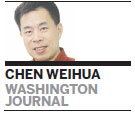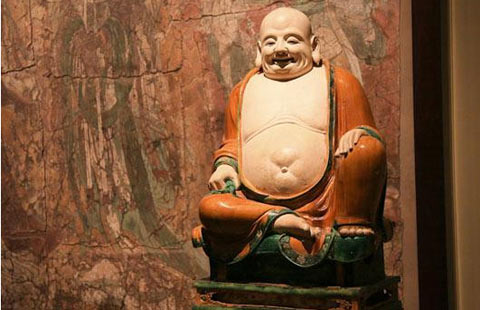Stalled TPP should pivot away from geopolitical gamesmanship
Updated: 2015-08-03 03:27
By Chen Weihua in Washington(China Daily USA)
|
||||||||
The failure of the Trans-Pacific Partnership (TPP) talks to reach a final deal last Friday in Maui, Hawaii, contrasted sharply with the optimistic mood in Washington early in the week among some officials and pundits that the largest US trade pact since the North America Free Trade Agreement (NAFTA) will be sealed.
The confident mood resulted partly from the victory won by the Obama administration in getting the Trade Promotion Authority (TPA), or fast-track authority in trade negotiations, from the Congress, in June, mostly against Obama’s own party and core supporters, such as trade unions, Senate Democratic Leader Harry Reid and House Minority Leader Nancy Pelosi.
However, it turned out last Friday that several countries of the 12 Pacific Rim nations negotiating the TPP were not yet ready to compromise on thorny issues such as autos, dairy, sugar and the monopoly period for next-generation drugs.

Though trade ministers are supposed to meet again sometime in August, the earlier optimism has been greatly dampened.
Asked on Sunday if a deal is possible before next year’s US elections, New Zealand Trade Minister Tim Groser told New Zealand media: “Who knows?”
While it is one thing how the countries involved are willing to make key concessions on the key issues, it is another for the US Congress to approve such a deal when the 2016 presidential race goes into full swing later this year. On Thursday, the Republican candidates will hold the first debate in the primary.
Failing to conclude the TPP would deny Obama a key legacy that he hopes to leave behind after his eight-year presidency. It will also deal a heavy blow to his US rebalance, or pivot, to Asia policy that has been criticized by many for its heavy military component.
Many US pundits have declared that without the TPP, the rebalance will no longer exist.
The US rebalance policy launched by Obama, including the military relocation, the TPP and the strategy of rallying allies, has been met with deep suspicion in China as a strategy to contain China and “looks like an attempt to cut China out of the Asian supply chains”, as Nobel economist Joseph Stiglitz said of the TPP.
Such negative Chinese feeling of US geopolitical gamesmanship was reinforced when Obama, in a desperate attempt to sell the TPP to the American public, repeatedly declared: “If we don't write the rules, China will write the rules out in that region.”
Nicholas Lardy, a senior fellow at the Peterson Institute for International Economics and an expert on the Chinese economy, said earlier that it would be good for China to join the TPP negotiations because it would be the first time China truly participated in shaping global rules.
For many Chinese, it is not acceptable for the US president to say that China — with a fifth of humanity, now the world’s largest trading nation and the second-largest economy, or the largest already according to IMF — is excluded from shaping global trade rules, or any rules of global governance.
Quoting estimates by economists, Jeffrey Bader and David Dollar, two senior fellows and China experts at the John L. Thornton China Center at the Brookings, wrote in a July 28 article that the potential gains from the TPP are huge for the US, Japan, Vietnam and other countries. They said the long-term effects of the TPP would depend on how other countries in the Asia-Pacific region react to it, and China is the biggest loser from the current version of the TPP, with the loss accounting for a tiny 0.2 percent of China’s economy. But they noted China’s losses from being left out will rise if more developing countries such as India, Indonesia and Thailand join.
The two believe most of the current TPP countries hope that China is eventually attracted to join. “The benefits of any deep liberalization agreement that includes China will be many times greater than agreements without China,” they wrote.
Chinese views of the TPP have been evolving in the past years among some officials and experts, with some believing that joining the TPP will help push along some difficult economic reform agendas at home, just as former Chinese Premier Zhu Rongji did with China’s accession to the World Trade Organization in 2001.
But some Chinese experts argue that China will be in a disadvantageous situation if it joined now under the current TPP provisions.
While the US is pushing for the TPP, China has recently gained much attention for its success in launching the Asian Infrastructure Investment Bank (AIIB), which the US failed to stall. China has also been actively promoting the One Belt One Road Initiative to develop connectivity linking developed and developing countries.
The Chinese government has openly welcomed participation by the US and Japan in both the AIIB and One Belt One Road and the US could reciprocate by extending a welcoming hand to China for the TPP, starting with Obama stopping the negative rhetoric of how the “US, not China, should write trade rules.”
None of this should become a geopolitical game.
Contact the writer at chenweihua@chinadailyusa.com.

 Tsingtao gets ready for huge beer festival in China
Tsingtao gets ready for huge beer festival in China
 Stunning Shu brocade and embroidery techniques
Stunning Shu brocade and embroidery techniques
 Kazan games: Diving in the sky
Kazan games: Diving in the sky
 Torrential rain wreaks havoc in Jinan
Torrential rain wreaks havoc in Jinan
 A glimpse of Chinese cultural relics in foreign museums
A glimpse of Chinese cultural relics in foreign museums
 Flying Tigers show in New York
Flying Tigers show in New York
 Kobe Bryant frenzy grips Guangzhou
Kobe Bryant frenzy grips Guangzhou
 Three generations keep traditional lion dance alive
Three generations keep traditional lion dance alive
Most Viewed
Editor's Picks

|

|

|

|

|

|
Today's Top News
Obama issues challenge on climate change
GOPs begin pivotal debate week
Negotiation seen as key to China, US cyber solution
Beijing plans 'Silicon Valley' park for traditional culture
Obama issues challenge on climate change with power plant rule
China role crucial in UN plan
Biden associates resume discussion about presidential run
Malaysia seeks help to widen search for MH370
US Weekly

|

|






